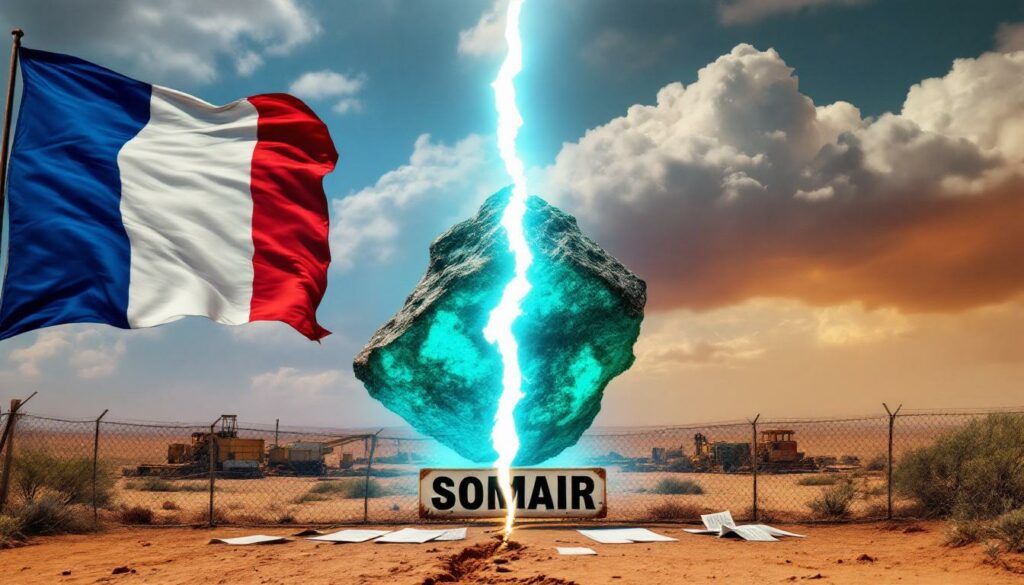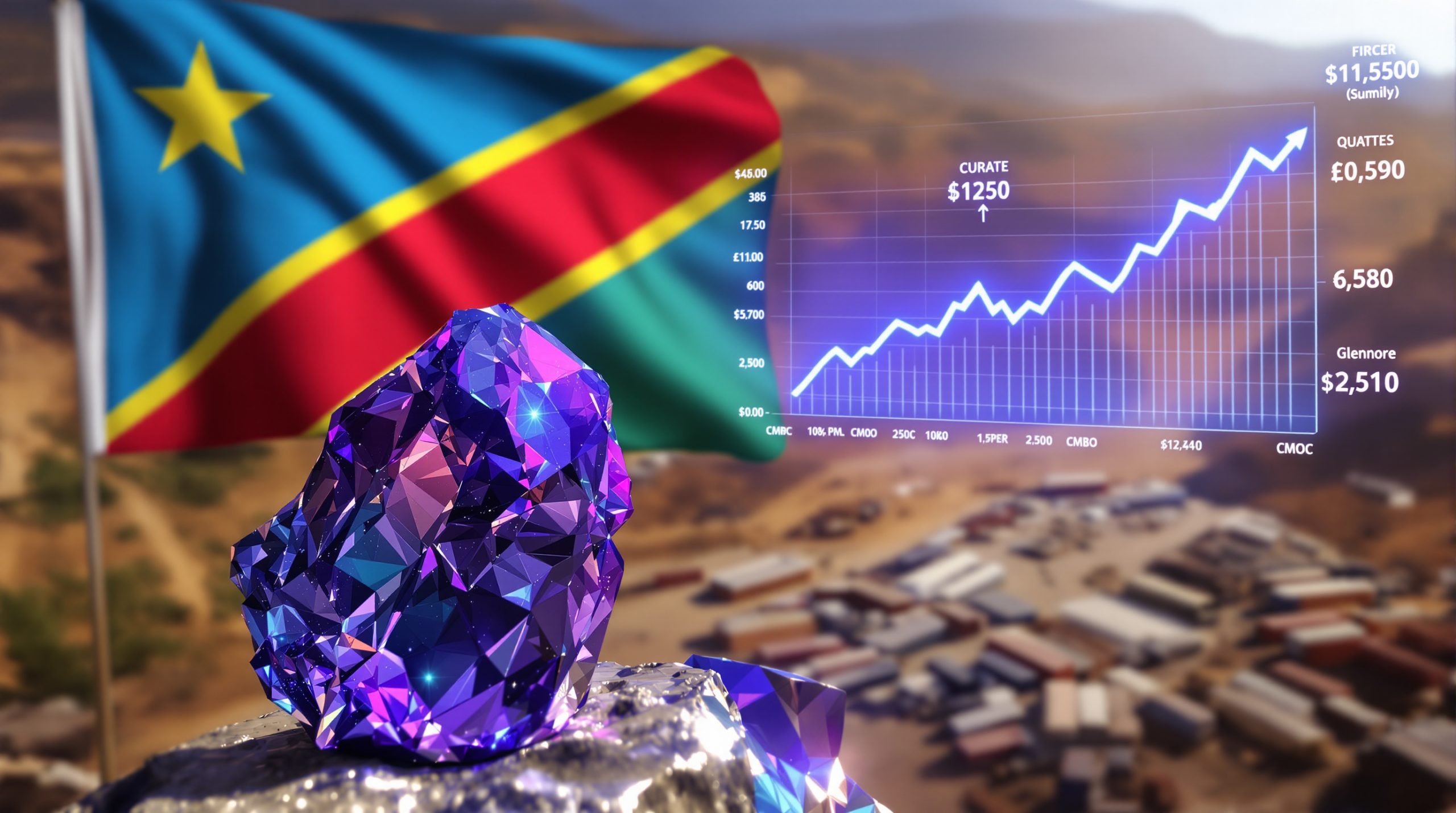France and Niger Uranium Dispute: Bankruptcy Looms for SOMAIR Mine
The longstanding uranium relationship between France and Niger stands at a critical crossroads as the SOMAIR mining operation faces imminent bankruptcy amid escalating tensions between the two nations. This high-stakes dispute threatens not only a significant uranium supply chain but also highlights broader geopolitical shifts across West Africa.
What is Happening with France's Uranium Operations in Niger?
SOMAIR (Société des Mines de l'Air), the joint uranium mining venture between French nuclear company Orano and the Niger government, teeters on the edge of financial collapse following export restrictions imposed by Niger's military government since late 2023.
The crisis represents a dramatic escalation in tensions over Niger's valuable uranium resources, which have underpinned the economic relationship between the former colonial power and its West African partner for decades.
"The Nigerien authorities' insistence on continuing production expenses at any cost has led to the current situation where the SOMAIR company is on the verge of bankruptcy," Orano stated in its July 2025 announcement.
The Current Financial Crisis at SOMAIR
Orano has been sounding alarms about SOMAIR's deteriorating financial condition since October 2024, with the situation now reaching a breaking point. The company claims that Niger's military government has created an impossible business environment by:
- Halting all uranium exports while demanding continued production
- Seizing operational control of the mining facility in December 2024
- Announcing plans to nationalize the mine entirely (June 2025)
- Refusing to address mounting financial losses
The 63-37 ownership split between Orano and Niger's state mining company SOPAMIN has become increasingly contentious, with both sides leveling accusations of financial mismanagement and exploitation.
How Did the Niger-France Uranium Dispute Evolve?
The current crisis represents the culmination of a rapidly deteriorating relationship following Niger's July 2023 military coup that overthrew the democratically elected government.
Timeline of Escalating Tensions
The dispute has unfolded against a backdrop of political upheaval and shifting resource nationalism:
- July 2023: Military coup in Niger overthrows the democratically elected government
- Late 2023: Niger halts uranium exports from SOMAIR
- December 2024: Niger's government seizes operational control of SOMAIR
- June 2025: Niger announces plans to nationalize the uranium mine
- July 2025: Orano declares SOMAIR is on the verge of bankruptcy
This progression reflects a broader trend of resource nationalism across West Africa, with military governments in Mali, Burkina Faso, and Guinea also asserting greater control over natural resources previously managed by Western companies.
Niger's Justification for Nationalization
Niger's military government has presented several justifications for its actions:
- Claims that Orano has extracted 86.3% of uranium production since operations began in 1971, despite holding only a 63% stake
- Assertions that "Niger's uranium exploitation had not fairly benefited the country" over five decades of operations
- Allegations from the country's main mineworkers union that Orano committed "acts of sabotage" to undermine the mine's viability under Niger control
The military government frames these actions as reclaiming national sovereignty over strategic resources, a narrative that has found resonance domestically and across the region.
What is the Strategic Importance of Niger's Uranium?
The dispute has significant implications for both global uranium market volatility and the energy security of France, which has historically relied heavily on Niger's uranium for its nuclear power program.
Niger's Position in Global Uranium Markets
As the world's seventh-largest uranium producer, Niger plays a meaningful role in global supply chains:
- Contributes approximately 5% of global uranium production
- Uranium spot prices reached $79 per pound in June 2025, a seven-month high
- Prices have increased 7% in 2025 alone, reflecting tight market conditions and supply concerns
For France specifically, Niger's uranium has been strategically crucial:
- Niger accounted for approximately 15% of Orano's uranium supply when operating at full capacity
- The uranium has historically supported France's nuclear power program, which generates about 70% of the country's electricity
- France's energy security strategy has increasingly focused on diversification of uranium sources
Economic Significance for Niger
Uranium mining represents one of Niger's most important industries and sources of hard currency:
- Major source of foreign exchange earnings in a resource-dependent economy
- Significant employer in a country with limited industrial development
- Critical revenue source for government operations and infrastructure
"While uranium mining has been a cornerstone of Niger's economy for decades, the benefits have not been equitably distributed," notes the Niger mineworkers union, justifying the government's more assertive stance.
How Does Orano Defend Its Position?
The French company has vigorously contested Niger's allegations and defended its operating history in the country.
Orano's Counter-Arguments
Orano has presented several defenses against Niger's accusations:
- Claims that Niger's state-owned partner SOPAMIN engaged in "opportunistic behavior" by refusing to take its share of production during low uranium price cycles
- States that "The State of Niger did not always exercise its offtake rights for several periods… particularly in low uranium price cycles"
- Asserts it was forced to purchase additional uranium above its shareholding percentage to keep the mine financially viable
- Denies allegations of sabotage made by Niger's mineworkers union
The company has portrayed itself as a responsible long-term partner that maintained operations even during challenging market periods when uranium mining halt in Namibia and other disruptions affected global supplies.
Orano's Current Priorities
As the dispute continues, Orano has indicated its immediate concerns are:
- Using remaining financial resources to pay employee salaries
- Maintaining industrial facilities to preserve their value
- Reserving the right to pursue legal action against Niger's government
The company appears to be simultaneously preparing for potential arbitration while leaving the door open for a negotiated settlement that might preserve some of its interests in Niger's uranium sector.
What Does This Dispute Reveal About Resource Nationalism in West Africa?
Niger's actions mirror similar moves by other military-led governments in West Africa, suggesting a regional pattern rather than an isolated incident.
Regional Trend of Asserting Control Over Natural Resources
The push for greater national control over strategic resources spans multiple countries:
| Country | Resource | Foreign Company | Government Action |
|---|---|---|---|
| Niger | Uranium | Orano (France) | Nationalization of SOMAIR mine |
| Mali | Gold | Barrick Gold (Canada) | State control of Loulo-Gounkoto complex |
| Burkina Faso | Gold | Various Western miners | Pressure for greater mining share |
| Guinea | Bauxite/Iron | Various Western miners | Renegotiation of mining contracts |
Mining analysts note that this trend represents a significant shift in how resource-rich African nations approach contracts with Western mining companies, with a greater emphasis on domestic control and larger revenue shares.
Shift Toward Russian Partnerships
A notable aspect of this regional trend is the pivot toward Russian interests:
- Military governments in Niger, Mali, and Burkina Faso have strengthened security ties with Russia
- Russian mining companies are increasingly being favored for new resource development
- Western influence in the resource sectors of these countries is diminishing rapidly
This geopolitical realignment has significant implications for resource supply chains that have historically been dominated by Western companies and oriented toward European markets.
What Are the Potential Consequences of SOMAIR's Bankruptcy?
The bankruptcy of SOMAIR could have far-reaching consequences for multiple stakeholders, from local communities to global uranium markets.
Economic Implications
The financial collapse could trigger several negative outcomes:
- Job losses for thousands of Nigerien workers at the mine and in supporting industries
- Reduction in tax revenue for Niger's government at a time of economic fragility
- Potential degradation of valuable mining infrastructure if maintenance is neglected
- Disruption to local communities economically dependent on the mine's operations
The timing is particularly challenging as Niger struggles with broader economic difficulties following international sanctions imposed after the 2023 coup.
Supply Chain Impacts
For global uranium markets, the disruption presents multiple challenges:
- Potential reduction in global uranium supply if production is interrupted for an extended period
- Further upward pressure on uranium prices, which have already seen significant increases
- Diversification of supply sources by uranium consumers previously reliant on Niger
- Increased market uncertainty at a time when nuclear power is experiencing renewed interest globally
The timing coincides with growing global uranium demand driven by both existing nuclear plants and new construction, particularly in China and India, as well as the US uranium import ban on Russian material.
Diplomatic Fallout
The dispute has broader geopolitical implications:
- Further deterioration in France-Niger relations, already strained by the military coup
- Potential impact on France's influence across its former colonies in West Africa
- Increased opportunity for Russia and China to expand their economic presence in the region
- Precedent-setting effect for other resource-rich nations considering similar nationalization moves
The situation represents a significant test case for how Western nations and companies respond to resource nationalism in an era of increasing competition for critical minerals.
What Legal Options Exist for Resolving the Dispute?
The complex legal landscape offers several potential pathways for resolution, though each presents significant challenges.
International Arbitration Possibilities
Orano has indicated it "reserves the right to legal action," which could include:
- Filing a case with the International Centre for Settlement of Investment Disputes (ICSID)
- Seeking arbitration under bilateral investment treaties between France and Niger
- Pursuing compensation through international commercial arbitration
- Challenging the nationalization through multinational forums
International arbitration often takes years to resolve, with uncertain outcomes that rarely satisfy either party completely.
Precedents for Resource Nationalization Disputes
Similar cases of resource nationalization have been resolved through various mechanisms:
- Negotiated settlements with compensation for expropriated assets (as seen in some Latin American cases)
- Long-term arbitration proceedings that sometimes result in partial compensation
- Political solutions involving new partnership arrangements with different terms
- Complete nationalization with minimal or no compensation (rare in modern cases)
The legal and financial complexity of uranium mining operations makes any resolution particularly challenging, as does the strategic importance of the resource to both countries.
What Does the Future Hold for Uranium Mining in Niger?
The path forward remains uncertain, with multiple potential scenarios depending on political decisions, economic realities, and legal outcomes.
Challenges for Niger's Independent Operation
If Niger proceeds with full nationalization, it will face several significant challenges:
- Securing technical expertise to maintain efficient operations and safety standards
- Accessing international markets for uranium sales amid potential legal disputes
- Obtaining capital for ongoing investment in mining infrastructure
- Managing nuclear waste disposal insights and environmental considerations
- Navigating potential international sanctions or restrictions on uranium exports
These challenges are substantial but not insurmountable if Niger can secure alternative technical and financial partnerships.
Potential Scenarios Moving Forward
Several outcomes remain possible:
- Complete nationalization with Niger taking full control of operations, potentially partnering with non-Western mining companies
- A negotiated settlement resulting in a new partnership structure with Orano, possibly with reduced French ownership
- Entry of new international partners, likely from Russia or China, bringing fresh capital and technical expertise
- Prolonged legal battles while the mine remains in operational limbo, potentially damaging the asset's long-term value
The resolution will likely depend on both economic pragmatism and political calculations by Niger's military government, which must balance nationalist sentiment with practical mining considerations.
FAQs About the France-Niger Uranium Dispute
What percentage of Niger's uranium does SOMAIR produce?
SOMAIR is one of Niger's largest uranium operations and has been a cornerstone of the country's uranium industry since the 1970s. While exact percentages fluctuate, it has historically accounted for a significant portion of Niger's uranium output.
How might this affect global uranium prices?
The disruption to Niger's uranium exports has already contributed to upward pressure on global uranium prices, which reached $79 per pound in June 2025. If production remains constrained, prices could continue to rise, especially as demand increases from the expanding nuclear power sector in Asia and renewed interest in Europe.
What are the environmental concerns related to uranium mining in Niger?
Uranium mining carries significant environmental risks, including radioactive contamination of soil and water sources. Local communities have raised concerns about health impacts and environmental degradation associated with decades of mining operations. Any transition in management must maintain rigorous environmental and safety protocols.
How might this affect France's nuclear energy program?
While Niger's uranium has been historically important for France, the country has diversified its uranium sources over time. France now obtains uranium from multiple countries, including Kazakhstan, Canada, and Australia, which helps mitigate supply disruptions from any single source. However, the loss of Niger's supply still represents a meaningful challenge.
What other countries are experiencing similar resource nationalism trends?
Beyond West Africa, resource nationalism has emerged as a significant trend in countries like Indonesia (nickel), Mexico (lithium), and Chile (lithium and copper), where governments are seeking greater control and benefits from their natural resources. Furthermore, in the United States, efforts to increase domestic production using US uranium production technology reflect similar concerns about resource security.
Disclaimer: This analysis contains forward-looking statements regarding uranium markets, mining operations, and geopolitical developments. These projections involve numerous uncertainties, and actual outcomes may differ substantially from those discussed. This information should not be considered investment advice.
Want to Invest in the Next Major Mineral Discovery?
Gain immediate notifications of significant ASX mineral discoveries with Discovery Alert's proprietary Discovery IQ model, turning complex data into actionable investment insights before the broader market. Visit the dedicated discoveries page to understand how major mineral discoveries can generate substantial returns and begin your 30-day free trial today.




